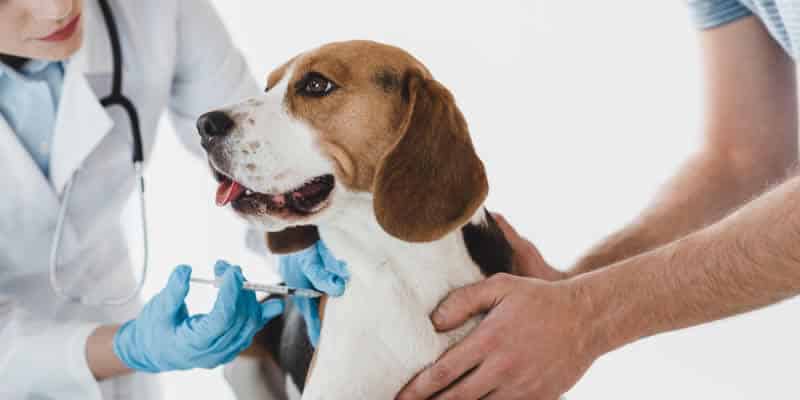
Vaccinations are probably one of the biggest responsibilities that those who decide to adopt a pet take on. However, it is not always clear how and when to vaccinate the animal, so in this article we want to offer you some indications regarding the vaccination schedule for dogs.
Why should you Vaccinate your dog
Vaccinations are important because they are part of the animal’s immunization process. This way you will prevent your friend from becoming infected with a large number of diseases caused by viruses , which would jeopardize your dog’s health and quality of life.
However, always remember that the ways and times of administering vaccines must always be established by the veterinarian , as they vary according to the size and breed of the dog, its age and even the place where the animal lives.
Things to know before vaccinating your dog
- Before starting the vaccination cycle, the dog must be deparasized : in this way, possible factors that could weaken the animal’s organism are eliminated and the assimilation of the vaccine is facilitated.
- The vaccination cycle should be started between the first month and a half and two months of the dog’s life, as indicated by the veterinarian.
- If you adopt an adult dog and you do not know its origin or it is a stray dog, you will need to hear the opinion of the veterinarian, who will be able to show you how to proceed. Also avoid, in the meantime, to keep him together with other animals, at least as long as your veterinarian advises you.
- Puppies that have not yet been vaccinated should not be let out, nor can you let them stay with other dogs : despite having been immunized from their mother’s milk , they are still vulnerable and could contract some disease that could cost them their life. Remember, therefore, that the socialization of a puppy can only begin when you have finished giving him all the necessary vaccinations.
- To establish the vaccination schedule, the medical record containing all the veterinary data of the mother is usually taken into consideration.
- The presence of certain viruses in dogs can affect the vaccination schedule.
Precisely because of the factors listed above, a dog’s vaccination schedule can change depending on the case , despite everything it is possible to identify a series of generally valid guidelines:
- After the first 6 weeks of a puppy’s life, it usually starts with Trivalent, which protects against hepatitis, distemper and leptospirosis .
- When the puppy is 8 weeks old, a vaccine is given against parvo , one of the most frequent causes of death in unvaccinated puppies.
- At 10 weeks (ie 4 weeks after the first administration) the Trivalent is recalled.
- At 12 weeks (also in this case 4 weeks after the first administration) the booster of the parvovirus vaccine is made.
- At 16 weeks, the rabies treatment is done and the initial vaccination cycle ends.
- Also remember that you will need to continue taking your dog to the vet for annual re-calls and at least once every six months for a general check-up.
Further recommendations
Remember that despite vaccinations the dog is not 100% exempt from being able to contract certain diseases: avoid risky situations, such as sniffing or playing with excrement or the blood of other animals.
Also avoid making him stay together with other dogs that you know are sick: it is certainly not a question of isolating him but only of politely inquiring, asking the owners of the dogs that normally play with yours, if and what diseases they have had and if they have been vaccinated.
Dog vaccines: side effects
Dog vaccines are the best tools owners have to safeguard their health. Since these are medicines, of course, there are also contraindications. In this article we will talk about the 6 side effects of dog vaccinations, which are more frequent and, in any case, not serious and easily solved.
Vaccination is essential to protect your dog from a wide range of parasitic diseases and conditions . Thanks to these vaccines , in fact, it is possible to avoid rabies, distemper and hepatitis (which can be fatal). Only in a few cases do these medications produce side effects. Generally, they occur in the hours following the administration of the vaccine or after a few days.
According to veterinarians, these consequences are related to a normal reaction of the organism that acts against a freshly injected external agent . It is important to keep in mind that puppies are the most vulnerable in this respect compared to adults. As well as, to suffer the most, are small dogs and those just neutered.
However, in most cases, these effects are not a serious problem . Vaccines arrive on the market after a series of analyzes and tests. Their effectiveness, and also the contraindications, are widely verified and documented. Furthermore, administering a vaccine does not depend on the choice of a master.
It is always and only the veterinarian who prescribes, administers and manages the vaccination of your animals . An expert doctor who will be able to show you every behavior even in the face of small complications. Always remember that DIY pet care can be very harmful.
Dog vaccines: the most common side effects
Let’s go into the specifics of the side effects of vaccines. In the following list we will show you the 6 most common consequences that occur following vaccination, with a series of very useful information:
1. Numbness
Once you leave the vet’s room, you may notice that your dog is tired, sad or sleepy. A reaction resulting from a moment of intense stress from which the animal needs to move away, recovering energy.
2. Apathy
Another consequence is an unusual behavior in which the dog avoids contact with the owner . A kind of punishment of your four-legged friend, for having taken him to a place that is not at all congenial to him. Changes in mood and aggression are the most obvious symptoms of this state.
3. Inflammation
It is the most frequent side effect after a vaccine. A small swelling may appear in the area where it has been applied. This is a consequence of the fact that the injected liquid has not yet entered fully into circulation . As the hours go by, everything should return to normal. This phenomenon can also be caused by a normal allergy (probably already known) or a reaction to the syringe or alcohol used to disinfect the area.
4. Gastrointestinal disorders
Some dog vaccines cause some stomach pain. Symptoms such as diarrhea or vomiting may occur in some dogs . Your pet will appear tired and not very hungry. You will notice an unusual position when he lies down. In such circumstances, dogs lean sideways so as not to press on the inflamed stomach. Gently caress the abdominal part to notice any swelling.
5. Respiratory disorders
The presence of coughing, sneezing or nasal discharge are frequent in the case of intranasal vaccines. Your dog may also have a fever or a general flu . No problem, however. The animal will rest for a few hours, without having too much desire to move or eat.
6. Anaphylaxis
It is the most serious side effect of dog vaccines. Therefore, more attention is needed in dealing with it. The first symptoms occur a few hours or minutes after the injection. It is characterized by inflammation of the nose and throat, which prevents a proper breathing. The animal has a weak pulse, redness of the skin, vomiting and diarrhea. It is a reaction of the organism so powerful that it comes to attack itself. The effect is the destruction of one’s own red blood cells. However, a very infrequent side effect, so you don’t have to worry: the chances of it happening to your dog are really low.
Finally, the message that must pass is simply one. Each dog that is vaccinated must be followed step by step in the immediate following moments, as well as check for any possible reaction to be communicated to your trusted veterinarian.






